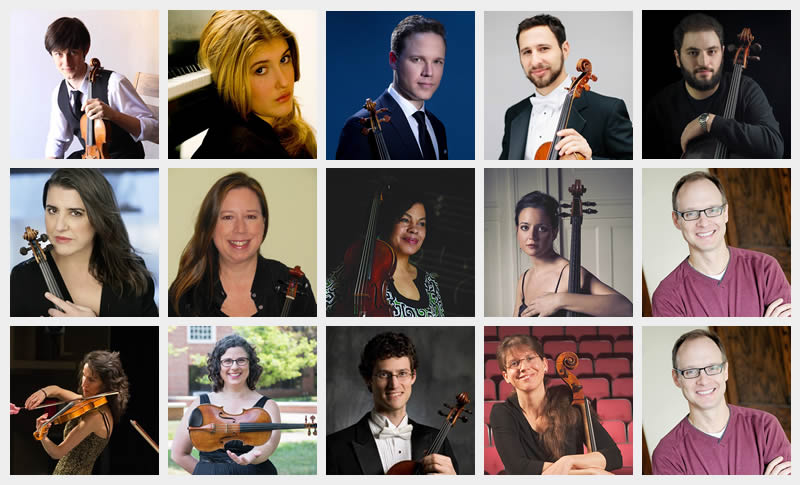The Eastern Music Festival kicked off its 58th concert season with an evening of chamber music: two standard and beloved gems sandwiching a more thorny, contemporary composition.
The evening began with a violin sonata considered to be one of the best in the literature. César Franck (1822-90) wrote his Violin Sonata in A in 1866 as a wedding present for his Belgian countryman and friend, violinist Eugène Ysaÿe. The performers were EMF associate concertmaster Nigel Armstrong and pianist Marika Bournaki. The opening movement begins with a gentle undulating piano part. Armstrong’s first bowings seemed a bit tentative, as if searching for the tune, but his close attention to slurring and phrasing revealed a refined and delicate technique that served this “French” piece to a T; it was an incredibly nuanced reading from beginning to end. Bournaki was able to provide gentle lyricism when called for as well as strong authority. The surging opening of the second movement could have used a bit more definition of the melodic line, and occasionally the piano overpowered the violinist, but ensemble between the first two was spot on. The third movement, Recitativo-Fantasia, was completely mesmerizing. The Finale, much of which is written as a canon, displayed impressive climactic moments, with passages that appropriately approximated hysteria.
Osvaldo Golijov (b.1960) grew up listening to both sacred and secular Jewish music as well as the work of his fellow Argentinian, Ástor Piazzolla (1921-92). The impetus for Golijov’s Last Round (1996) was the unexpected death of Piazzolla. The composition is scored for string nonet (double string quartet and double bass) and is in two contrasting movements. The performers in quartet 1 were Nadja Salerno-Sonnenberg and Catherine Cary,violins, Diane Phoenix-Neal, viola,and Rebecca Zimmerman, cello; quartet 2 was comprised of Ioana Galu and Jenny Grégoire,* violins, Jamie Hofman, viola, and Beth Vanderborgh, cello. “Mediating” the two groups was Meredith Johnson, double bass. The opening “Movido, urgente” featured abrupt changes in tempo as the two quartets flung riffs back and forth. As the composer states, “The bows fly in the air as inverted legs in crisscrossed choreography, always attracting and repelling each other, always in danger of clashing….” The “leader” of this band of equals was Salerno-Sonnenberg. whose toe-tapping and foot-stomping goaded the players into trading musical insults. The movement’s rhythmic vitality was on steroids. The second movement, “Muertes del angel” (Deaths of the Angel), is more languid and gentler, with occasional passionate passages. According to Golijov, this movement is “a final, seemingly endless opening sigh.” The ethereal conclusion held the audience spellbound until applause finally broke the silence.
The evening concluded with the Piano Quartet in E-flat, Op.47 (1842), by Robert Schumann (1810-56). Pianist Bournaki returned to the keyboard and was joined by Netanel Draiblate, violin, Ben Geller, viola,and Julian Schwarz, cello. Like the Franck sonata, the quartet is considered to be one of the finest in the literature. Incidentally, it was Schumann’s wife, Clara Wieck Schumann, who was the pianist for the premiere, in Leipzig. The somber, slow opening presents an important motive before block chords and sparkling piano cascades bring forth the main Allegro, taken in this performance at a speed that seemed a bit too fast. The second movement Scherzo also hustles along – great fun for all. The slow movement contains a full-throated Romantic tune first presented in the cello before it is passed to the other instruments – absolutely heavenly! Much of the finale is given over to sparkling fugal writing, where independent lines are prominent. All four musicians’ fleet fingers caught the good energy. Communication among all four was excellent throughout the 30-minute work.
The Eastern Music Festival continues through July 27 with great music at every turn. See our calendar for complete details.
_____ *Edited/corrected 6/26/19.











